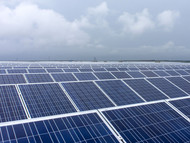China Speeding U.S. Solar-Dumping Case as Election Nears: Energy
China is accelerating a dispute with the U.S. over solar-energy taxes, moving forward its next salvo to hit as President Barack Obama faces re-election.
China’s Ministry of Commerce will make preliminary findings as early as November, eight months before the deadline, on a complaint that U.S. manufacturers are dumping polysilicon, according to officials at Daqo New Energy Corp. (DQ) and Jiangsu Zhongneng Polysilicon Technology Development Co., two of four companies that brought the case. Ministry officials are visiting the companies to gather proof of damage.
“We’ll show our financial condition, workforce details and the impact on income,” Kevin He, investor relations manager for Daqo, said in an interview. “We hope the government sets appropriate punishment tariffs to curb dumping and protect us from damages” from U.S. and South Korean imports.
China’s potential penalties on imported polysilicon, the most costly material in making solar cells, comes after the Obama administration announced plans to impose punitive duties of as much as 250 percent on U.S. imports of Chinese solar cells. The trade dispute is heating up as Obama seeks re- election in November. The Chinese government hasn’t said its move is a retaliatory measure.
The struggle between the world’s biggest energy-consuming nations centers on state support for the solar industry, a business both Obama and Chinese Premier Wen Jiabao have said is a priority. Global investment in solar projects rose 61 percent to $137.8 billion last year.
Secretary of State Hillary Clinton, in Beijing for talks with Chinese officials, said today that while the two nations don’t “see eye to eye” on everything, “we are convinced that our two countries gain far more when we cooperate with one another than when we descend into unhealthy competition.”
‘Broader’ Conflict
The biggest U.S. polysilicon producer by capacity is closely held Hemlock Semiconductor Corp., whose largest market is China. A spokesman for the Hemlock, Michigan-based company declined to comment and referred to comments made in July by Dow Corning Corp. President Bob Hansen.
The Chinese case “is part of a broader trade conflict extending far beyond the polysilicon and solar industries, as an escalating number of trade disputes have been initiated throughout the globe in the last 12 months,” he said.
Chinese ministry officials have already visited Jiangsu Zhongneng to gather evidence of damage, company Deputy Manager Lv Jinbiao said in an interview. The company is a unit of China’s GCL-Poly Energy Holdings Ltd. (3800), the world’s largest polysilicon maker by annual production capacity, which is 65,000 metric tons, according to data compiled by Bloomberg.
Commerce Department
Lv and He both said they expect a preliminary decision on possible duties against U.S. companies as early as November. The administration of Obama, who has dueled with challenger Mitt Romney over Chinese trade policy, said the duties it plans are necessary to counter Chinese dumping, or selling below cost.
The U.S. Commerce Department announced in May it will impose sanctions on Chinese solar cells. It set preliminary tariffs on imports after companies including the U.S. unit of Germany’s Solarworld AG (SWV) said Chinese rivals were selling products below their costs in the U.S.
The Chinese solar-silicon makers have begun pushing for the punitive tariffs to be imposed 90 days retroactively after a decision is announced against U.S. importers, He and Lv said.
“We’re seeing signs that more and more sales are being lost” because of cheaper U.S. imports Lv said. His company joined Daqo, LDK Solar Co. (LDK) and China Silicon Corp. in calling for the investigation and duties earlier this year.
Polysilicon Prices
Overcapacity and slower demand from Europe following a cut in subsidies has resulted in lower earnings at global suppliers of solar panel makers. The average spot price of polysilicon has dropped about 26 percent this year to $20.33 a kilogram. Prices for silicon-based solar cells have lost about 18 percent to 42 U.S. cents a watt this year, Bloomberg New Energy Finance data shows.
GCL-Poly, based in Hong Kong, last month reported a quarterly loss of HK$330 million ($43 million), its first since the second half of 2009. Daqo said on Aug. 17 that its net loss in the second quarter was $7.1 million compared with a profit of $25.7 million a year earlier.
GCL-Poly’s shares traded in Hong Kong have plunged 45 percent this year compared with a 5.4 percent gain for the benchmark Hang Seng. Daqo’s shares are down 50 percent in New York. The 17-member Bloomberg Industries Global Large Solar Index has declined 39 percent in the period.
LDK Solar Co.’s credit rating on Sept. 3 was cut one level by Shanghai Brilliance Credit Rating & Investors Service Co., its second downgrade since June, on the solar-wafer maker’s operating losses and souring export outlook.
China will take “relevant measures” to require the U.S. to provide fair treatment to renewable energy goods, according to a Ministry of Commerce statement released on Aug. 20.
To contact Bloomberg News staff for this story: Feifei Shen in Beijing at fshen11@bloomberg.net
To contact the editor responsible for this story: Reed Landberg at landberg@bloomberg.net
©2012 Bloomberg L.P. All Rights Reserved. To subscribe or visit go to: www.bloomberg.com
